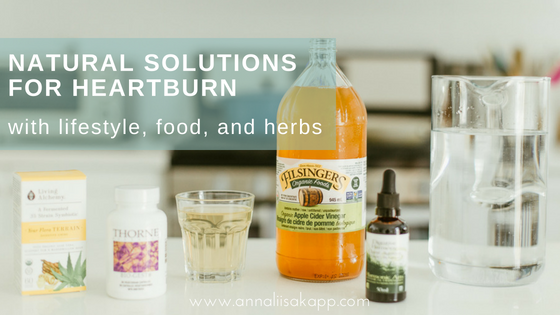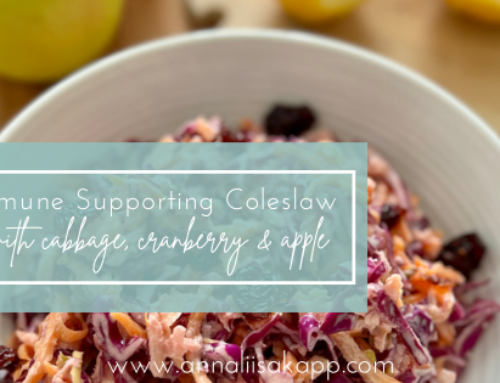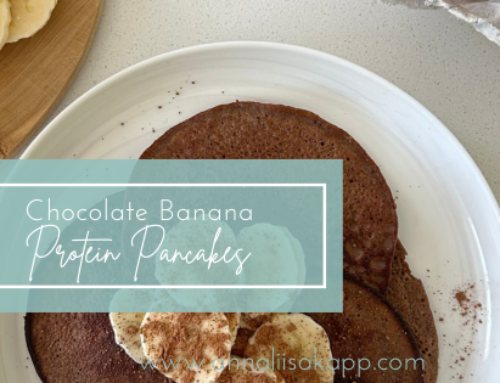
The odds are that you or someone you know experiences heartburn. Around half of North American adults experience it at least once per month. Somewhere between 10-20% have it at least once per week! Heartburn, also known as reflux, occurs when the strong acid in your stomach creeps up into your esophagus.
It can feel like a burning sensation; hence the name “heartburn.” Other common symptoms include bloating, burping, difficulty swallowing, or a sore throat. Often there is a bitter or sour taste as well. Don’t get me wrong, stomach acid is good! Stomach acid is essential for good health and optimal digestion.
We need the acid in our stomach to protect us against harmful microbes (i.e. bacteria) that lurk in our food and drinks. Stomach acid also helps us break down our food, and digest nutrients. But we need that acid to stay in the stomach, and not get up to our esophagus!
Stomach acid doesn’t usually burn the stomach itself; this is because the stomach is protected by a layer of mucus.
But your esophagus doesn’t have that same protection. It has a valve that is supposed to prevent things from going the wrong way (i.e. keep food, drink, and acid down; not allow it back up). And when your esophagus is exposed to stomach acid too often, it can cause the infamous burning, inflammation, and other potential issues.
I’m going to share a bunch of tips that may help you overcome your heartburn symptoms naturally. Of course, if symptoms last for a long time, or get worse, it’s probably a good idea to see your doctor.
Why Might You Get Heartburn?
We now know that heartburn is most often caused by too little acid in the stomach. Either the food has been sitting in the stomach for too long because there is not enough acid to properly break it down or the esophageal valve is not functioning properly and fails to keep the contents of the stomach from rising up into the esophagus.
Common Root Causes of Heartburn:
✓ low stomach acid
✓ overeating
✓ eating too fast
✓ consuming too much coffee or caffeine
✓ consuming too much sugar or refined carbohydrates
✓ smoking
✓ drugs
✓ food allergies and sensitivities wheat
✓ certain health conditions such as ulcers, gallbladder problems or IBS
✓ stress or anxiety
✓ H. pylori or other infectious overgrowth
.
Tip #1 – Foods to eat (and avoid)
What to avoid:
You may notice that when you eat or drink certain things, you get heartburn soon afterward.
These triggers may be different for everyone; but often include: onions, garlic, chocolate, citrus, tomato, mint, spicy foods, greasy foods, coffee, carbonated drinks, or alcohol. If any of these affect you, reduce them or even try cutting them out to see if it makes a difference.
Heartburn might also result from a sneaky food intolerance. Try eliminating grains, dairy, and processed foods for a few weeks and see if that helps.
Now, you may be wondering: “If I eliminate these foods/drinks, then what can I put in their place?”
What to eat:
Try increasing fiber intake. Yes, this means more whole, unprocessed foods, especially veggies! Try getting at least five, working your way up to nine, servings of veggies every day.
You can also take 1 Tbsp of raw unpasteurized apple cider vinegar in 1 glass of water 30 minutes before you eat a meal. You can do this before each meal to signal to your digestive system to star producing it’s own natural digestive support (hydrochloric acid, bile, enzymes) so it can start to work optimally. This might be too acidic for individuals with a very sensitive digestion, but try it out for yourself. If you find it too harsh, try using the apple cider vinegar in your salad dressing instead.
Use ginger in your cooking and tea to provide temporary relief. Use 1-2 tsp in 1 cup of boiled water – steeped for 10 minutes. This has anti-inflammatory actions to support better digestive health.
Try switching from coffee to green tea, as it can inhibit the growth of H. Pylori, the bacteria that can create issues in the stomach.
.
Tip #2 – How and when to eat
Remember, digestion starts in the mouth – but it’s actually a complex series of events that happens before you even take a bite.
Smell your food to activate the digestive system, take a few breaths to release stress. Chew your food very well. Put the fork down between bites.
Don’t eat meals that are too big. (try using a smaller plate)
And don’t eat too close to bedtime. You want to avoid lying down with a full stomach. We’re talking finishing eating 2-3 hours before lying down, so schedule your dinner or snack with this in mind.
.
Tip #3 – Lifestyle techniques
Sometimes strenuous exercise can make heartburn symptoms worse. If this happens to you, then focus on low-intensity exercises like walking and cycling.
If symptoms come on as you’re lying down to sleep, try adding a pillow or two so your head is a bit higher than your stomach.
Another interesting tip is to try sleeping on your left side. Lying on your left side works because the valve that prevents the acid from “leaking” into your esophagus is located on the right side of the stomach. So, when you’re lying on your left, the acid is away from that valve.
Stress management techniques used daily (like practicing yoga, 10 minute meditation, or 5 deep breaths before you eat and acupuncture) can have a huge impact on your digestive health, including relief from heartburn.
.
Tip #4 – Herbs to the Rescue
Acid-blocking drugs are widely used for heartburn and acid reflux. But these medications only provide short-term relief and ultimately lead to additional digestive woes. Nature has some remedies that work with your body to create harmony. I like to use a herbal combination of:
Deglycrrhizinated Licorice (DGL) – which soothes inflammation and fights bacterial, viral and parasitic infection. DGL also increases the number of mucus-secreting cells in the intestine which improves the quality of the mucosal lining. The fact that the licorice root is deglycyrrhizinated means that there’s no risk of it increasing your blood pressure (as can happen with regular licorice root).
Marshamallow and Slippery Elm Bark also have traditional uses as gastrointestinal-supportive herbs. They have mucus lining protective and soothing properties, and may help protect against ulcers and excess acidity in the body because it causes reflux stimulation of nerve endings in the gastrointestinal tract, and that reaction leads to increased mucus secretion.
Aloe Vera is a soothing mucilaginous substance that can help decrease inflammation and gastric ulcers.
I often suggest this natural product by Thorne Research to my clients with great results.
.
Conclusion
Heartburn is a very common condition where stomach acid creeps up into the esophagus (where it’s not supposed to be).
If you suffer from symptoms of heartburn, there are many things you can do. There are foods and drinks to avoid and veggies to increase. You can eat slower, chew more thoroughly, and don’t lie down within 2-3 hours of eating. Also, try low-intensity exercise and sleeping on your left side.
Try these simple, natural strategies. They can help prevent or relieve heartburn symptoms for you.
A private nutrition consultation can help you gain clarity on which foods, supplements, and lifestyle choices would be best suited for you so you can feel confident in what to eat, gain deeper understanding into your health concern, and start making improvements to your health immediately. Learn more and book in for your consultation here.






